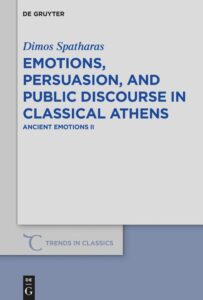
Ancient Emotions II
Dimos Spatharas
Volume 83 in the series Trends in Classics – Supplementary Volumes
https://doi.org/10.1515/9783110618174
De Gruyter, 2019
ISBN eBook: 9783110618174, Hardcover: 9783110618037, Paperback: 9783110763324
About the book
This book is an addition to the burgeoning secondary literature on ancient emotions. Its primary aim is to suggest possible ways in which recent approaches to emotions can help us understand significant aspects of persuasion in classical antiquity and, especially audiences’ psychological manipulation in the civic procedures of classical Athens. Based on cognitive approaches to emotions, Skinner’s theoretical work on the language of ideology, or ancient theories about enargeia, the book examines pivotal aspects of psychological manipulation in ancient rhetorical theory and practice. At the same time, the book looks into possible ways in which the emotive potentialities of vision -both sights and mental images- are explained or deployed by orators. The book includes substantial discussion of Gorgias’ approach to sights ‘ emotional qualities and their implications for persuasion and deception and the importance of visuality for Thucydides’ analysis of emotions’ role in the polis’ public communication. It also looks into the deployment of enargeia in forensic narratives revolving around violence. The book also focuses on the ideological implications of envy for the political discourse of classical Athens and emphasizes the rhetorical strategies employed by self-praising speakers who want to preempt their listeners’ loathing. The book is therefore a useful addition to the burgeoning secondary literature on ancient emotions. Despite the prominence of emotions in classicists’ scholarly work, their implications for persuasion is undeservedly under-researched. By employing appraisal-oriented analysis of emotions this books suggests new methodological approaches to ancient pathopoiia. These approaches take into consideration the wider ideological or cultural contexts which determine individual speakers’ rhetorical strategies.
Table of Contents
Frontmatter, I
Preface, VII
Contents, IX
Introduction: Persuasion, rhetoric, and the theory of emotions, 1
1. Vision and emotions in Gorgias, 24
2. Vision and collective emotions in Thucydides: eros, pothos, and anger, 57
3. Enargeia, emotions, and violence in forensic storytelling, 80
4. The ideological uses of ‘legitimate envy’ in classical Athens, 123
5. Self-praise and envy in rhetoric and the Athenian courts, 159
Afterword, 189
Bibliography, 193
Index Rerum et Nominum, 211
Index Auctorum Antiquorum et Locorum, 215